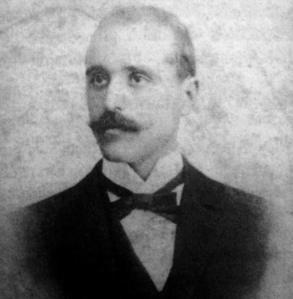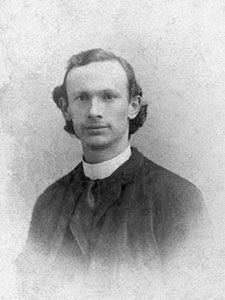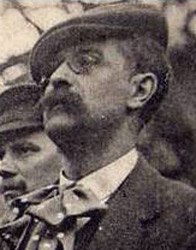
Syndicalism is a radical current in the labor movement that was most active in the early 20th century. Its main idea is the establishment of local worker-based organizations and the advancement of the demands and rights of workers through strikes. According to the Marxist historian Eric Hobsbawm, it was predominant in the revolutionary left in the decade which preceded the outbreak of World War I because Marxism was mostly reformist at that time.
Anarcho-syndicalism is a political philosophy and anarchist school of thought that views revolutionary industrial unionism or syndicalism as a method for workers in capitalist society to gain control of an economy and thus control influence in broader society. The end goal of syndicalism is to abolish the wage system, regarding it as wage slavery. Anarcho-syndicalist theory therefore generally focuses on the labour movement.

Errico Malatesta was an Italian anarchist. He spent much of his life exiled from Italy and in total spent more than ten years in prison. Malatesta wrote and edited a number of radical newspapers and was also a friend of Mikhail Bakunin.
The International Workers' Association is an international federation of anarcho-syndicalist labor unions and initiatives.

Thomas Mann (1856–1941) was an English trade unionist. Largely self-educated, Mann became a successful organiser and a popular public speaker in the labour movement.

The Red International of Labor Unions (RILU), commonly known as the Profintern, was an international body established by the Communist International with the aim of coordinating Communist activities within trade unions. Formally established in 1921, the Profintern was intended to act as a counterweight to the influence of the so-called "Amsterdam International", the Social Democratic International Federation of Trade Unions, an organization branded as class collaborationist and an impediment to revolution by the Comintern. After entering a period of decline in the middle 1930s, the organization was finally terminated in 1937 with the advent of the Popular Front.

Luigi Fabbri was an Italian anarchist, writer, and educator, who was charged with defeatism during World War I. He was the father of Luce Fabbri.

The Free Association of German Trade Unions was a trade union federation in Imperial and early Weimar Germany. It was founded in 1897 in Halle under the name Representatives' Centralization of Germany as the national umbrella organization of the localist current of the German labor movement. The localists rejected the centralization in the labor movement following the sunset of the Anti-Socialist Laws in 1890 and preferred grassroots democratic structures. The lack of a strike code soon led to conflict within the organization. Various ways of providing financial support for strikes were tested before a system of voluntary solidarity was agreed upon in 1903, the same year that the name Free Association of German Trade Unions was adopted.

The National Labor Secretariat was a trade union federation in the Netherlands from 1893 to 1940.

Christiaan Gerardus Cornelissen was a Dutch syndicalist writer, economist, and trade unionist.
The International Anarchist Congress of Amsterdam took place from 24 August to 31 August 1907. It gathered delegates from 14 different countries, among which important figures of the anarchist movement, including Errico Malatesta, Luigi Fabbri, Benoît Broutchoux, Pierre Monatte, Amédée Dunois, Emma Goldman, Rudolf Rocker, Christiaan Cornelissen, etc.

Milly Witkop(-Rocker) was a Ukrainian-born Jewish anarcho-syndicalist, feminist writer and activist. She was the common-law wife of the prominent anarcho-syndicalist leader Rudolf Rocker. The couple's son, Fermin Rocker, was an artist.

The First International Syndicalist Congress was a meeting of European and Latin American syndicalist organizations at Holborn Town Hall in London from September 27 to October 2, 1913. Upon a proposal by the Dutch National Labor Secretariat (NAS) and the British Industrial Syndicalist Education League (ISEL), most European syndicalist groups, both trade unions and advocacy groups, agreed to congregate at a meeting in London. The only exception was the biggest syndicalist organization worldwide, the French General Confederation of Labor (CGT). Nevertheless, the congress was held with organizations from twelve countries participating. It was marked by heated debate and constant disagreements over both tactics and principles. Yet, it succeeded in creating the International Syndicalist Information Bureau as a vehicle of exchange and solidarity between the various organizations and the Bulletin international du mouvement syndicaliste as a means of communication. It would be viewed as a success by almost all who participated.
The International Secretariat of National Trade Union Centres (ISNTUC), often simply referred to as the International Secretariat and later renamed the International Federation of Trade Unions (IFTU), was an international consultative body of trade unions. Founded in 1901, it broke apart and became defunct during the First World War.
Alexander "Sanya" Schapiro or Shapiro was a Russian anarcho-syndicalist activist. Born in southern Russia, Schapiro left Russia at an early age and spent most of his early activist years in London.

Marije Cornelissen is a Dutch politician who served as a Member of the European Parliament from 2009 until 2014.
The Syndicalist League of North America was an organization led by William Z. Foster that aimed to "bore from within" the American Federation of Labor to win that trade union center over to the ideals of Revolutionary syndicalism.
Over the past 150 years, anarchists, anarcho-syndicalists and libertarian socialists have held many congresses, conferences and international meetings in which trade unions, other groups and individuals have participated.
The International Socialist League of South Africa was the earliest major Marxist party in South Africa, and a predecessor of the South African Communist Party. The ISL was founded around the syndicalist politics of the Industrial Workers of the World and Daniel De Leon.

René de Marmande was a French journalist and anarchist.










